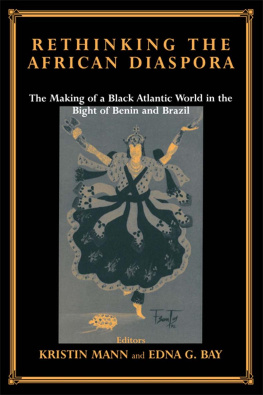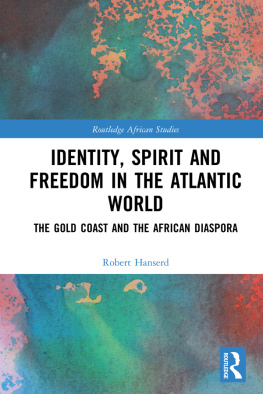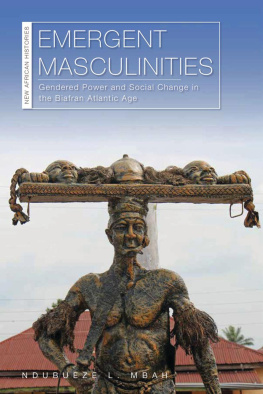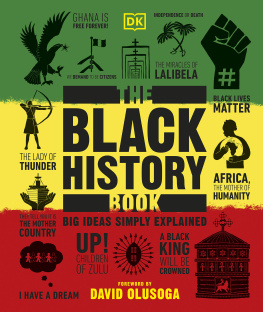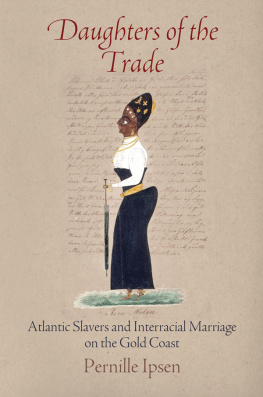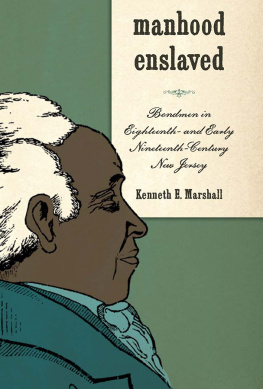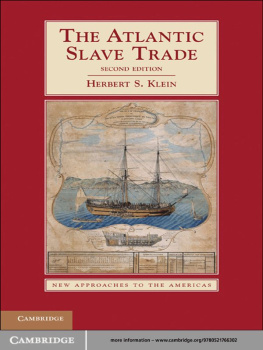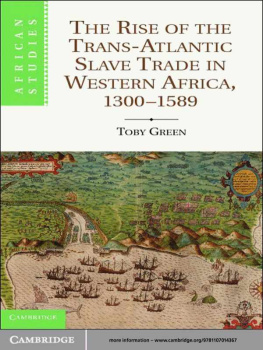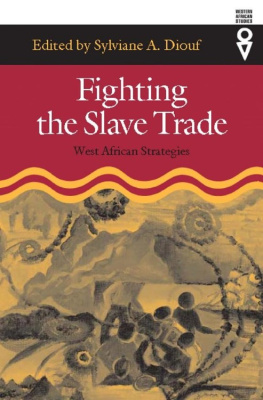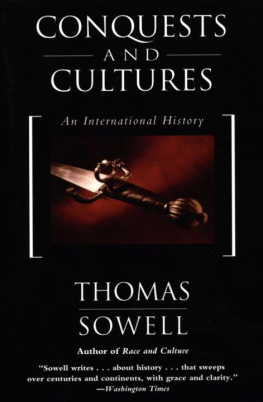STUDIES IN SLAVE AND POST-SLAVE SOCIETIES AND CULTURES
Series Editors: Gad Heuman and James Walvin
RETHINKING THE AFRICAN DIASPORA
STUDIES IN SLAVE AND POST-SLAVE SOCIETIES AND CULTURES
Series Editors: Gad Heuman and James Walvin
ISSN 1462-1770
Other Titles in the Series
Unfree Labour in the Development of the Atlantic World
edited by Paul E. Lovejoy and Nicholas Rogers
Small Islands, Large Questions
Society, Culture and Resistance in the Post-Emancipation Caribbean edited by Karen Fog Olwig
Reconstructing the Black Past
Blacks in Britain 1780-1830 by Norma Myers
Against the Odds
Free Blacks in the Slave Societies of the Americas edited by Jane G. Landers
Routes to Slavery
Direction, Ethnicity and Mortality in the Atlantic Slave Trade edited by David Eltis and David Richardson
Popular Politics and British Anti-Slavery
The Mobilisation of Public Opinion against the Slave Trade, 1787-1807 by J.R. Oldfield
Classical Slavery
by M.I. Finley
Slavery and Colonial Rule in Africa
edited by Suzanne Miers and Martin Klein
From Slavery to Emancipation in the Atlantic World
edited by Sylvia R. Frey and Betty Wood
After Slavery
edited by Howard Temperley
RETHINKING THE
AFRICAN DIASPORA
The Making of a Black Atlantic World in
the Bight of Benin and Brazil
Editors
KRISTIN MANN
and
EDNA G. BAY
Emory University
First published 2001 by Frank Cass Publishers
Published 2013 by Routledge
2 Park Square, Milton Park, Abingdon, Oxon OX14 4RN
711 Third Avenue, New York, NY, 10017, USA
Routledge is an imprint of the Taylor & Francis Group, an informa business
Copyright 2001 Taylor & Francis
ISBN 13: 978-0-714-68158-0 (pbk)
ISBN 13: 978-0-714-65129-3 (hbk)
British Library Cataloguing in Publication Data
Rethinking the African diaspora : the making of a black
Atlantic world in the Bight of Benin and Brazil. (Studies in slave and post-slave societies and cultures)
1.African diaspora 2.Africans Benin, Bight of 3.Africans Brazil 4.Brazil Civilization African influences
I.Mann, Kristin, 1946- II.Bay, Edna G. (Edna Grace), 1943325.81
Library of Congress Cataloging-in-Publication Data
Rethinking the African diaspora : the making of a black Atlantic world in the Bight of Benin and Brazil/ editors, Kristin Mann and Edna G. Bay
p. cm. (Studies in slave and post-slave societies and cultures, ISSN 1421770)
Includes bibliographical references and index.
ISBN 07146-5129-X (cloth) ISBN 07146-8158-X (pbk.)
1. African diaspora. 2. Brazil-Civilization-African influences. 3. Africa, West-Civilization-Brazilian influences. 4.
Brazilians-Benin, Bight of, Region-History. 5. Benin, Bight of, Region-History. I. Mann, Kristin, 1946- II. Bay, Edna G. II.
Series.
DT16.5.R48 2001
981-dc21
2001028986
This group of studies first appeared as a special issue of Slavery and Abolition, Vol.22, No.1, April 2001, published by Frank Cass.
Contents
One of the most heavily travelled migration routes from the Old World to the New was the trajectory of slave ships that left the coast of West Africa along the Bight of Benin and landed their human cargo in Brazil. An estimated 2,000,000 persons over the course of some 250 years were forced migrants along this route, arriving mainly in the Brazilian province of Bahia. UNESCO recently launched a series of international collaborative efforts to research more intensively the nature and impact of this traffic, and of the Atlantic slave-trade generally. The results, some of which are represented by the papers in this issue, dramatically revise scholarly interpretations of the cultural impact of transatlantic contacts. Earlier generations of scholars had posited a unidirectional movement of enslaved persons stripped of identity and culture, or they looked for possible retentions of Africa among descendants of slaves in the Americas. As a result of new research, we are beginning to understand movements of peoples and cultures in the south Atlantic instead as a series of interactions and influences back and forth across seas and cultures from the earliest period of the slave-trade up to the present. These papers indicate that a dynamic and continuous movement of peoples east as well as west across the Atlantic forged diverse and vibrant reinventions and reinterpretations of the rich mix of cultures represented by Africans and peoples of African descent on both continents.
Nearly all of these papers were initially presented at a major international conference on the growth of commercial, historical and cultural links between the Bight of Benin and north-eastern Brazil that was held on the Emory University campus in the spring of 1998. Bringing together scholars from Brazil, North America, Africa and the United Kingdom, the conference programme allowed participants to explore collectively elements of cultural contact and production spread through the activities of slave-traders, political representatives, religious specialists, popular artists, and leading intellectuals. Like the diaspora that was its subject, the conference proved to be a stimulating movement of ideas among scholars whose own individual intellectual experiences were based on the study of some portion of the peoples, goods, beliefs, and material cultures found between the Bight of Benin and Brazil. In selecting a set of papers from among the 18 originally presented, we wish to share the excitement of these fresh insights with a broader scholarly audience.
Our initial selection of papers for publication was made on the basis of the quality of research and the authors close adherence to the themes of ethnicity, religion, and identity over time and place in the south Atlantic diaspora. Kristin Mann's contribution provides an overview of the theoretical models and issues addressed by the individual contributions. The papers by Elisee Soumonni, Olabiyi Yai, and Robin Law explore complementary aspects of the growth and development of Afro-Brazilian culture and community along the Bight of Benin and most particularly in the area of the major slave-trading port of Ouidah (Whydah). Luis Nicolau Pars, Joo J. Reis, and Alberto da Costa e Silva look at different aspects of the religious practices of Africans and their descendants in Brazil. Edna Bay explores African perceptions of the overseas trade, including its use by the kingdom of Dahomey as a form of exile for political dissidents, while Kim Butler addresses issues of the construction of identity in the wake of moving and shifting cross-Atlantic cultural influences.
We wish to acknowledge the financial support of Emory University, the Palmares Foundation of Brazil, and the Nigerian Hinterland Project of York University for the conference that inspired the papers in this special issue. The Emory College Institute for Comparative and International Studies funded the translation of one article and provided other support for the papers preparation and publication.
Historians of Africa and the Americas have recently discovered one another and begun to glimpse the benefits of closer cooperation in their efforts to document and interpret the development of the African diaspora. Yet differences of opinion on how to conceive of the diaspora can quickly dominate their conversations with one another, inhibiting meaningful exchange. This essay begins by introducing two dominant paradigms on which the discourse has drawn, and then argues that the opposition that has been posited between them is neither necessary nor any longer intellectually fruitful. The work seeks to demonstrate that a way around the conceptual impasse lies in recovering the longer, richer and more complex history of the diaspora. From this history, even as briefly and incompletely surveyed here, a new and more heuristically powerful paradigm begins to emerge. The article concludes by introducing ideas from the rapidly developing field of Atlantic history and culture and examining their usefulness for the study of the African diaspora. It shows, at the same time, how research on the diaspora also demands that we recast dominant ideas about the Atlantic world.

